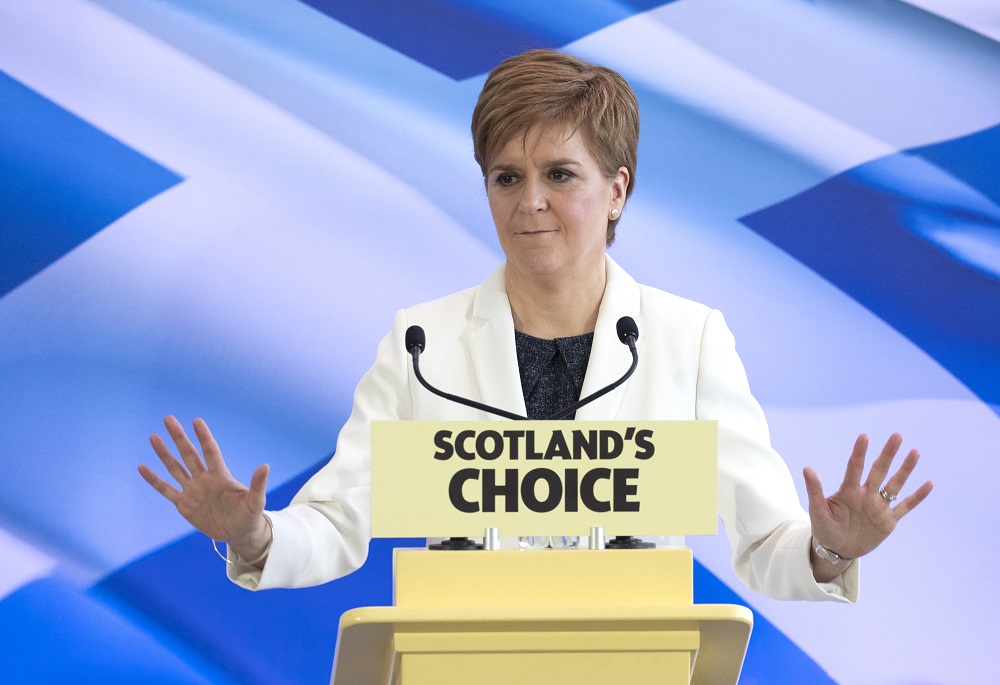Stronger, fairer economy best achieved through independence, says Sturgeon

Scotland’s First Minister has said building a “stronger, fairer and more sustainable” economy was more likely with independence than remaining in the UK but refused to say when the country would move to a separate currency.
The First Minister unveiled her Government’s post-independence plans for the economy in a 108-page paper today, 17 October, in a press conference at her official residence.
The paper laid out some plans around an independent Scotland’s currency, borders and more detail on a proposed £20 billion capital fund to be set up in the first decade after independence.
Speaking from Bute House, the First Minister, who admitted that independence did not guarantee economic prosperity for the country, said: “Fundamentally, we argue in this paper that a stronger, fairer, more sustainable economy is more possible for Scotland with independence than it ever will be with continued Westminster control.”
The document detailed the Government’s proposals for the creation of a separate Scottish pound, but the First Minister repeatedly refused to give a timescale for moving to the new currency.
Until the currency is created, Scotland will continue to use sterling, but is likely to have no control over monetary policy.
In the paper, a number of economic tests must be met before such a move, including that a new Scottish central bank would establish the “credibility” of the currency, creating sufficient reserves and Scotland being “fiscally sustainable” – as well as the Scottish Parliament approving the shift.
“Why don’t we put a particular time scale on that? Because we consider that would be not responsible,” the First Minister said.
“One of the criteria for the exact time at which that move is made would be the overall economic conditions and, therefore, if you tie yourself into a specific timescale, you could end up trying to do it at a time that would not be optimal.”
The First Minister, reiterating what was said in the paper, told journalists the move would come “as soon as practicable”.
When asked if the time scale could be five or 10 years, the First Minister said she hoped it would take less time than that.
Scottish pound
Membership of the European Union – one of the Scottish Government’s key arguments for independence – would not be possible until Scotland has control of its monetary policy and currency, but the First Minister said negotiations for access to the bloc could go forward during the transition phase to a new currency.
In order to create the Scottish pound, the Scottish Government would have to set up a central bank, the process for which the paper said would start immediately after a vote for independence.
By the time Scotland is officially independent, the document said, the central bank would be set up and become the lender of last resort and a banker for the Scottish Government, with the independent body eventually tasked with setting monetary policy when the currency goes live.
When asked what constitutes fiscal sustainability – one of the criteria for the move to a Scottish pound – the First Minister said: “Fiscal sustainability is not about an overnight balancing of the budget for any country.
“It is assessed by the institutions that we’ve spoken about here: a central bank, the beefed up Scottish Fiscal Commission; assessed by them that we are on a medium path to fiscal sustainability both in terms of deficit and the path of debt and these would be judgements that would be informed for Parliament who would take this decision.”
The document also laid out plans for a £20 billion fund that would invest in capital projects in the first decade after independence.
The Building a New Scotland Fund would use a mixture of oil and gas revenues and borrowing to fund projects that would aim to enable the transition to net zero, drive “inclusive economic growth” and “build resilient and sustainable places”.
‘Increased taxes’
The Institute for Fiscal Studies (IFS), however, said Scotland would likely face either increased taxes or cuts in public spending unless onshore economic growth is boosted to counteract the declining North Sea sector.
Responding to the paper, the IFS said Scotland would be faced with a “substantial deficit” after independence, meaning borrowing would have to be used for the fund.
Scottish Tory leader Douglas Ross said the paper was trying to “sell a pig in a poke”, adding: “It’s completely the wrong priority at the worst possible time for Scotland.
“Nicola Sturgeon should be using Government resources to help struggling families instead of to push for another divisive and unwanted referendum.”
Scottish Labour finance spokesman Daniel Johnson said the Scottish Government had “no answers to the key economic questions” of independence and Scottish Lib Dem leader Alex Cole-Hamilton said the plan was “a dangerous recipe for years of chaos”.
Support our Nation today
For the price of a cup of coffee a month you can help us create an independent, not-for-profit, national news service for the people of Wales, by the people of Wales.





Absolutely!
The women is more deluded than Truss and that is saying something
It’s this sort of economic breakdown the Welsh Independence movement needs. The organisation needs clarity, it needs to show the Welsh public that there is a clear plan.